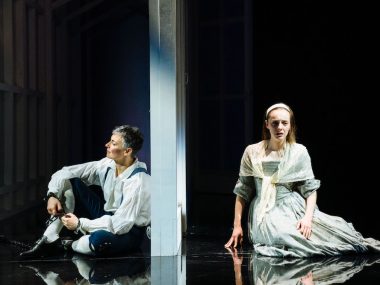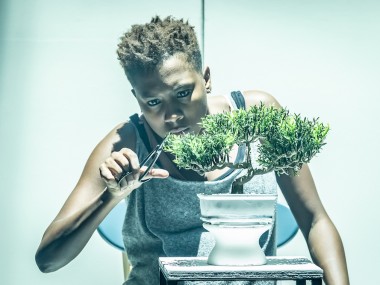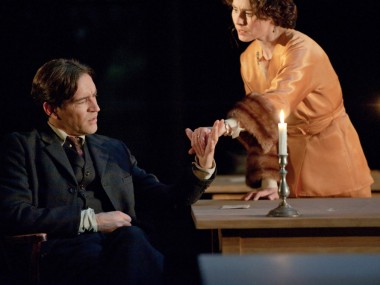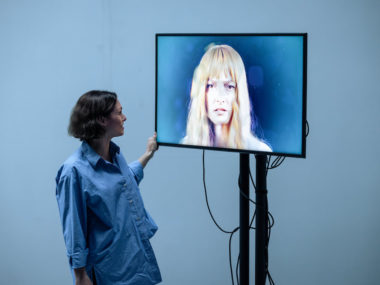Octopolis, Hampstead Theatre
Monday 25th September 2023
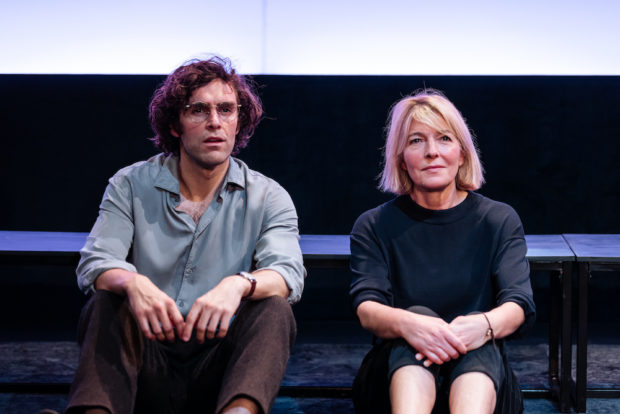
How many hearts does an octopus have? Answer: three. This pub quiz clincher is just one of the many fascinating facts that emerge from Octopolis, Marek Horn’s engrossing 100-minute two-hander which explores the relationship between humans and cephalopods, and is currently playing in the Hampstead Theatre Downstairs space, starring Jemma Redgrave and Ewan Miller. As well as diving into the depths of a philosophical enquiry into what kind of consciousness such a creature could have, the play also shows how scientific research can be seriously compromised by the personal relationships of its practitioners.
Set in a university residence, home of Professor George Grey (Redgrave), an expert on octopus intelligence who has a huge tank inhabited by the eight-legged Frances in her sitting room, the plot begins when Harry (Miller), a younger anthropologist, arrives to stay with her. Since George has recently lost her husband John, she is in a vulnerable state and relies on Frances, bizarrely but believably, for emotional support. An octopus instread of a cat. As she introduces Harry to the sea creature’s abilities, which include camouflaging herself and signaling information by changing colour, he becomes fascinated by the possibility that octopuses have the ability to create culture as well as just survival strategies.
Named after the surprise discovery of a colony of octopuses near Sydney, which seems to indicate that these famously solitary creatures can cohabit like “a flatshare”, Horn’s play is a terrifically cerebral discussion between two scientists about the implications of Frances’s aquatic behaviours. If she has a nervous system that is devolved all across her body, with tentacles that have the ability to make independent decisions, what does that say about the nature of consciousness and intelligence? Are humans unique because we have language (probably); are we unique because we feel and think (probably not); are we unique because we can create gods (um, maybe). Can animals have souls? Or are all these features on a spectrum across all life forms?
Of course, these discussions are affected by the increasingly love-hate relations between George and Harry. In a dazzling opening sequence, Horn uses a mixture of narrative and dialogue to introduce the two characters, who are immediately interesting as well as hilariously at odds. As they talk about Frances, other themes emerge out of ooze: the subjectivity of scientific observation, the need to pay attention to other members of the animal kingdom (or should that be republic?), and the way that human myths explore metaphorically some of the same ground that modern science tramples over.
There’s an erotic charge not only in Frances’s presence (she is described as the third person in George’s marriage), but also in the way the characters touch, or perform yoga exercises. Above all, both Harry and George dance in the scene changes to the music of David Bowie in sequences that are tentative, tender, excited and beautifully exciting to watch. From “Sound and Vision” to “Moonage Daydream”, with a quick intellectual riff on “Lazarus” and the relationships between fans and the star, the play is partly a joyful love letter to Bowie and a more complicated love song about, well, love. By end, with a bitter satire on academic writing, the full sadness of the situation swims into view. It is, spoiler alert, a contemporary tragedy.
Horn’s writing is not only philosophical; it is also bursting with comic one-liners which up-end expectations in a story whose plot twists are determined by the actions of, er, Frances. There is something wonderfully wild, crazy or surreal even, about the power of a sea creature trapped in a tank to be able to affect the thoughts and emotions of the humans who cohabit in the same dwelling. And, equally daringly, somehow the intellectualizing about the different types of consciousness in our world finds a great match in Bowie’s space-spooked lyrics and music — his Glastonbury performance of “Let’s Dance” is a highpoint. And although we never literally see Francis in her tank her presence, signaled by a variety of light changes, is as strong as that of the humans.
Ed Madden’s superb production is sensitive to both the thrilling ideas and shifting emotions of the play, and designer Anisha Fields metaphorically spare set, along with Jamie Platt’s vivid lighting, give life to the situation, which is never static. Redgrave’s George and Miller’s Harry have a convincing empathy and dynamic which enables them to power through the scenes. Whether they stand still in tension, or dance coolly together, they repay your attention to every alteration of feeling. Their final speeches feel like a cri de cœur, a protest about the limitations of our everyday career-minded world in which cynicism always seems to win over generosity. And if, unlike octopuses, humans only have one heart, it’s an organ that can only too easily break in two. Oh well, never mind, let’s dance.
This review first appeared on The Arts Desk

